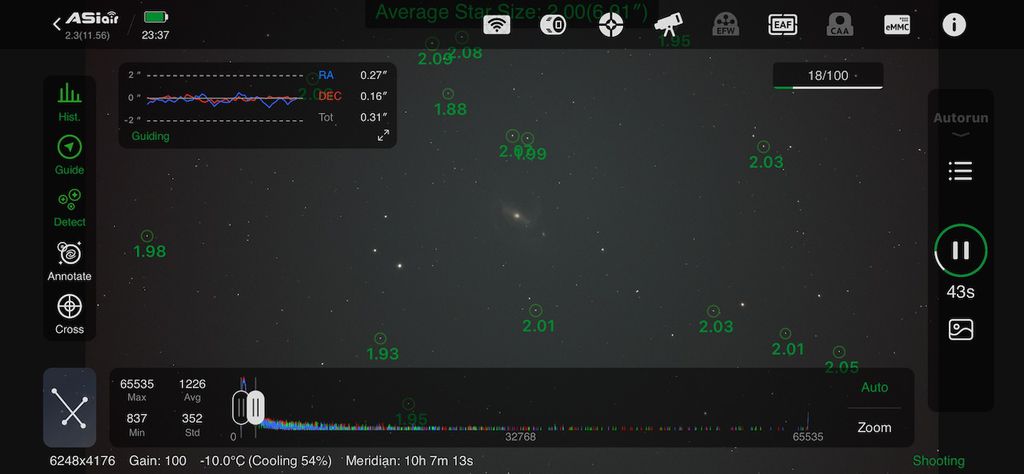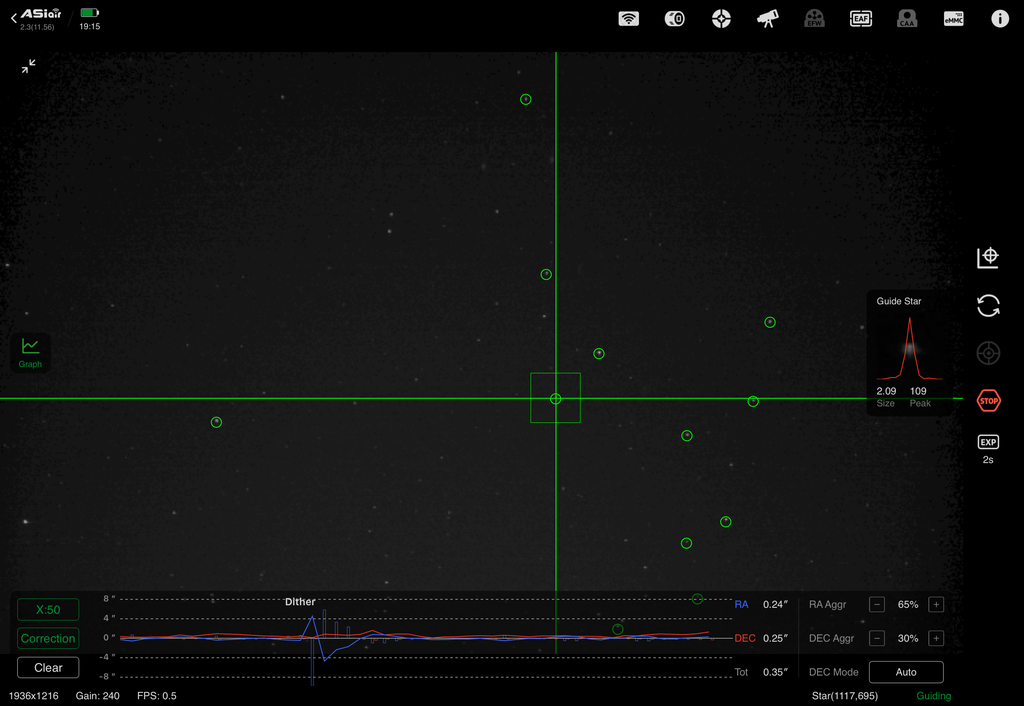Unrelated but somewhat informational. on my secondary rig I now have an ASI2600MC duo, the guiding numbers again average around .80, this is on par with my (external guiding) with both my zwo32mm and askar52mm (those are using the asi220mm mini).
I am not positive but I feel like my guiding is largely influenced by seeing and light pollution and less by the gear I am using.
I also tried an experiment with an OAG, on a really wide scope. The fma180 pro, this works about the same as the external guide scopes too. However it is a REAL pain to get focused. I heard once you nail it, it makes life easier, but I must have not nailed yet.
Other information that might be useful
My Sirius EQ-G guides about 10% better than my AM5.. I hear that is because the AM5 needs more frequent updates which makes sense for the mount type
I havent really dug into this. With my current setups and sensor, and my decision to keep my images around 180s, I dont really need anything better than 1 arc second anyway.
But just throwing in the variable of (exposure time on your guide camera) is another thing to track. And I know from experience that on some mounts, this could be helpful allowing for frequent updates and potentially increasing the guiding accuracy.
I have to laugh, I remember when guiding was a foreign concept to me, now that I understand it, I think many of us are overthinking, and then buying more gear hoping for improvements.
In my case, I am very used to having to defend my gear purchases to my wife, so I usually defend frivolous or un-needed purchases valiantly, but I would hope the forums are a safer place where I can admit (I just threw away a couple hundred bucks)
|
You cannot like this item. Reason: "ANONYMOUS".
You cannot remove your like from this item.
Editing a post is only allowed within 24 hours after creating it.
You cannot Like this post because the topic is closed.
Copy the URL below to share a direct link to this post.
This post cannot be edited using the classic forums editor.
To edit this post, please enable the "New forums experience" in your settings.
You cannot like this item. Reason: "ANONYMOUS".
You cannot remove your like from this item.
Editing a post is only allowed within 24 hours after creating it.
You cannot Like this post because the topic is closed.
Copy the URL below to share a direct link to this post.
This post cannot be edited using the classic forums editor.
To edit this post, please enable the "New forums experience" in your settings.
I think I have heard that a few times
|
You cannot like this item. Reason: "ANONYMOUS".
You cannot remove your like from this item.
Editing a post is only allowed within 24 hours after creating it.
You cannot Like this post because the topic is closed.
Copy the URL below to share a direct link to this post.
This post cannot be edited using the classic forums editor.
To edit this post, please enable the "New forums experience" in your settings.
A filter won't do anything for coma. You need a coma corrector for that.
But what you are describing is not coma. It is just halos. Halos are not a problem for guiding because PHD cares only about the center (the dots). Neither is imperfect focus. In fact being slightly out of focus tends to improve things because the blurring reduces noise, the effects of seeing and the number of fully saturated pixels at the center of a star, making it easier to find the true center.
I believe the last time I refocused my guidescope was in 2022(!) and that was only needed because I had disassembled everything for the house move.
|
You cannot like this item. Reason: "ANONYMOUS".
You cannot remove your like from this item.
Editing a post is only allowed within 24 hours after creating it.
You cannot Like this post because the topic is closed.
Copy the URL below to share a direct link to this post.
This post cannot be edited using the classic forums editor.
To edit this post, please enable the "New forums experience" in your settings.
A filter won't do anything for coma. You need a coma corrector for that.
But what you are describing is not coma. It is just halos. Halos are not a problem for guiding because PHD cares only about the center (the dots). Neither is imperfect focus. In fact being slightly out of focus tends to improve things because the blurring reduces noise, the effects of seeing and the number of fully saturated pixels at the center of a star, making it easier to find the true center.
I believe the last time I refocused my guidescope was in 2022(!) and that was only needed because I had disassembled everything for the house move. Thanks  |
You cannot like this item. Reason: "ANONYMOUS".
You cannot remove your like from this item.
Editing a post is only allowed within 24 hours after creating it.
You cannot Like this post because the topic is closed.
Copy the URL below to share a direct link to this post.
This post cannot be edited using the classic forums editor.
To edit this post, please enable the "New forums experience" in your settings.
There is a gestalt to guiding. Figuring out to set the rate for your particular mount. Seeing if things stay stable at different rates. Adjusting gain so that fainter stars are seen and/or adjust speed to 2 or 3 seconds also is added adjustments to improve the vision of camera.
|
You cannot like this item. Reason: "ANONYMOUS".
You cannot remove your like from this item.
Editing a post is only allowed within 24 hours after creating it.
You cannot Like this post because the topic is closed.
Copy the URL below to share a direct link to this post.
This post cannot be edited using the classic forums editor.
To edit this post, please enable the "New forums experience" in your settings.
Tony nailed it. Each setup is different. When I started guiding which wasn't that long ago. I started of inn the mid 0.6 range and now, if the seeing is good, it will hang around 0.28. That's with a E factory stock EQ6R-Pro and 80mm f/5 achromat guide scope. The two things I had to learn was that guiding is a lot more seeing dependent then I thought and RMs error lower than your power to resolve it still can matter if RA and DEC error are not equal. This is even more of an issue with the shorter subs I prefer. With long subs you can get round stars and still be loosing resolution due to guiding.
|
You cannot like this item. Reason: "ANONYMOUS".
You cannot remove your like from this item.
Editing a post is only allowed within 24 hours after creating it.
You cannot Like this post because the topic is closed.
Copy the URL below to share a direct link to this post.
This post cannot be edited using the classic forums editor.
To edit this post, please enable the "New forums experience" in your settings.
Tony Carro:
There is a gestalt to guiding. Figuring out to set the rate for your particular mount. Seeing if things stay stable at different rates. Adjusting gain so that fainter stars are seen and/or adjust speed to 2 or 3 seconds also is added adjustments to improve the vision of camera. Thanks. Great advice.
|
You cannot like this item. Reason: "ANONYMOUS".
You cannot remove your like from this item.
Editing a post is only allowed within 24 hours after creating it.
You cannot Like this post because the topic is closed.
Copy the URL below to share a direct link to this post.
This post cannot be edited using the classic forums editor.
To edit this post, please enable the "New forums experience" in your settings.
Tony Gondola:
Tony nailed it. Each setup is different. When I started guiding which wasn't that long ago. I started of inn the mid 0.6 range and now, if the seeing is good, it will hang around 0.28. That's with a E factory stock EQ6R-Pro and 80mm f/5 achromat guide scope. The two things I had to learn was that guiding is a lot more seeing dependent then I thought and RMs error lower than your power to resolve it still can matter if RA and DEC error are not equal. This is even more of an issue with the shorter subs I prefer. With long subs you can get round stars and still be loosing resolution due to guiding. Thanks. Great advice.
|
You cannot like this item. Reason: "ANONYMOUS".
You cannot remove your like from this item.
Editing a post is only allowed within 24 hours after creating it.
You cannot Like this post because the topic is closed.
Copy the URL below to share a direct link to this post.
This post cannot be edited using the classic forums editor.
To edit this post, please enable the "New forums experience" in your settings.
Typical of last night from my rig. Prior to the meridian flip it was guiding on a bright star at 0.1 sec cycle time, and the mount was guiding to 0.1 arcsec rms in both axes. I know the mount (CQ350) is responsive but that was plain nuts. After the flip it had to use something fainter at 1 sec cycle. Guiding with an ASI2600MC DUO on an MN65 (165mm aperture, 900mm focal length).  |
You cannot like this item. Reason: "ANONYMOUS".
You cannot remove your like from this item.
Editing a post is only allowed within 24 hours after creating it.
You cannot Like this post because the topic is closed.
Copy the URL below to share a direct link to this post.
This post cannot be edited using the classic forums editor.
To edit this post, please enable the "New forums experience" in your settings.
 This is my current guiding tonight on my Askar OAG . Shooting at 370mm on Askar V. Hopefully will have some Soul Nebula pics to down load. . Tony
|
You cannot like this item. Reason: "ANONYMOUS".
You cannot remove your like from this item.
Editing a post is only allowed within 24 hours after creating it.
You cannot Like this post because the topic is closed.
Copy the URL below to share a direct link to this post.
This post cannot be edited using the classic forums editor.
To edit this post, please enable the "New forums experience" in your settings.




